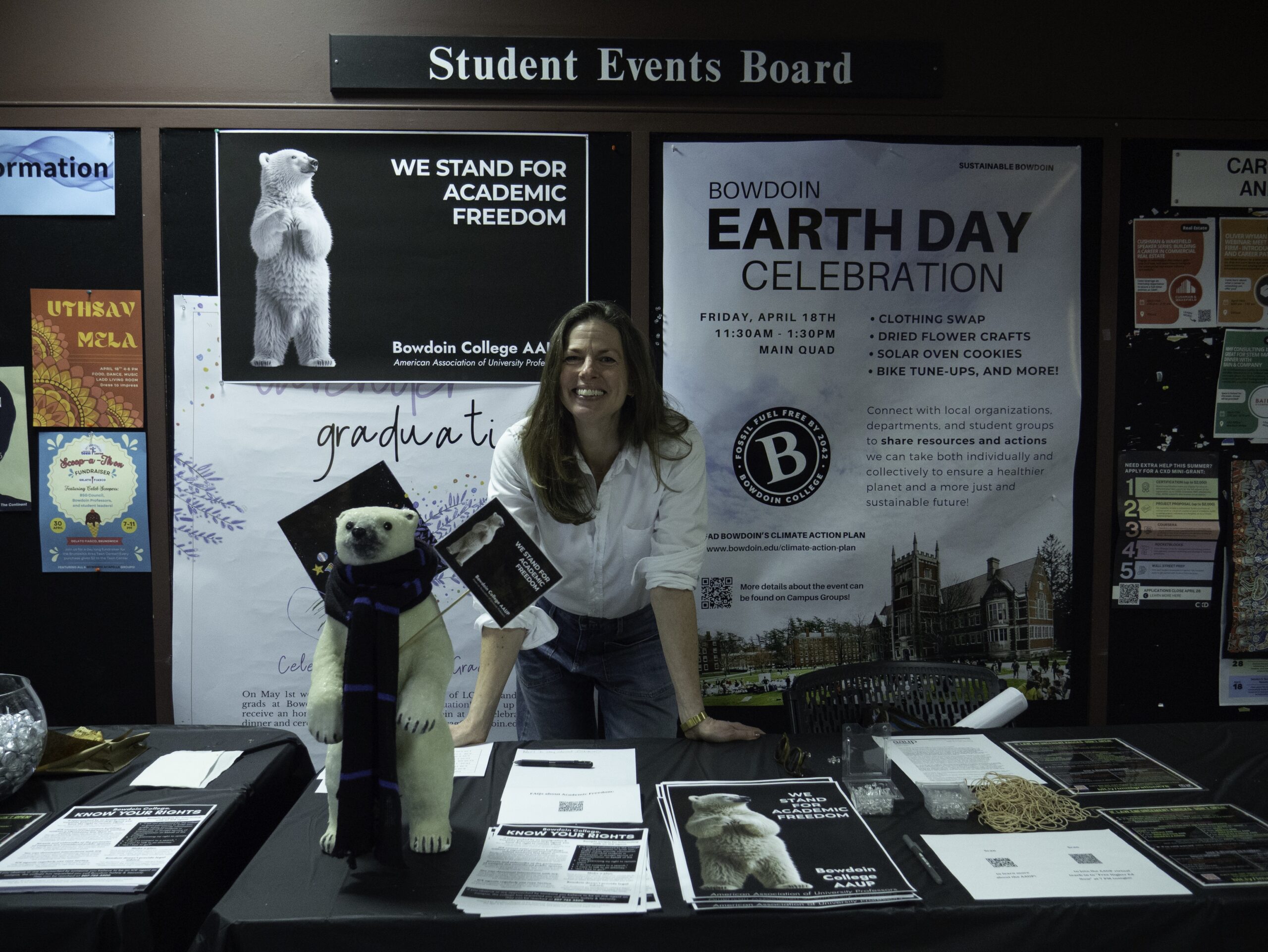Professors table in Smith for AAUP Day of Action, call for academic freedom
April 18, 2025
 Isa Cruz
Isa CruzBowdoin professors affiliated with the American Association of University Professors (AAUP) tabled in Smith Union yesterday to advocate for academic freedom and open discussion on college campuses. The tabling, which took place from 8:30 a.m. to 5 p.m., was part of the AAUP’s National Day of Action, which was organized by the Coalition for Action in Higher Education, an AAUP subgroup.
The purpose of the day, according to the press release shared by the Bowdoin AAUP, was to raise awareness around the Trump administration’s “hostile takeover” of American higher education. AAUP chapters at more than 100 colleges and universities organized for the National Day of Action along with Bowdoin.
“Higher education in the United States is subject to an unprecedented wave of attacks and defunding. We stand for the principle that education is a public good and a civil right that benefits the whole of society and should be freely accessible to all. To serve this public function, higher education must be a place of free inquiry,” the press release reads.
“Today these principles are under attack like never before,” the press release continues. “It is essential that we stand together as students, faculty, and staff to defend the central educational mission of Bowdoin from efforts to stifle freedom of inquiry and to dismantle democratic norms of governance.”
More than 24 professors participated in tabling during the day, including Associate Professor of English and AAUP steering committee member Aaron Kitch.
Kitch emphasized that Thursday’s tabling was not specifically inspired by the letter the House of Representatives’ Committee on Education and Workforce sent the College investigating its response to February’s Students for Justice in Palestine encampment.
“The letter is not the source of this day,” Kitch said. “But certainly we are hoping that the administration follows the example of those schools like Harvard that have rejected forms of interference and hostile occupation and conditions that are untenable for the future of the College.”
Though the letter didn’t directly incite the Day of Action, it was on the minds of some of its participants. Assistant Professor of Religion and Asian Studies Claire Robison, one of the professors who tabled, shared how the letter and congressional investigation into the College has caused her and many of her colleagues to worry about the state of academic freedom.
“There have been events recently, including that letter, that add another layer of concern that there is a type of limited expression, which to us feels harmful and detrimental to the college experience itself, which we hope, again, is a place where there can be a free exchange of ideas,… particularly debating structures of power or inequality in the world,” Robison said.
Robison reflected on Bowdoin’s response to the letter, acknowledging the difficult position the administration is in while wishing for more transparency.
“I would say a lot of us wish we could have more details, more knowledge, more transparency about how Bowdoin is responding,” Robison said. “That’s why we’re here today, to try to at least promote the values that brought us to academia and that we really deeply admire and want to promote within the college campuses and in the country in general.”
Finn Torres ’25, one of several students who stopped by the professors’ table, explained the value he sees in professors speaking out on college campuses.
“Right now, it’s a scary time to be living in. And I think students really look up to professors because you get all your information from professors in an academic sense,” Torres said. “I think to be able to see that your professors are standing for academic freedom, for the ability to teach what’s going on right now, I think is really important.”
Kitch, who has been a member of Bowdoin’s AAUP chapter for multiple years, noted a recent increase in membership and participation.
“We’ve had meetings with 30 to 40 faculty and staff on a weekly basis all year. So it’s about twice the size [from past years],” Kitch said. “The main reason, I think, is the sense of the threats to job security, to intellectual and academic freedom, to the normal functioning of our college.”
Yesterday’s table was the Bowdoin AAUP’s first major event of the year. According to Kitch, the group is planning further action, but the details are still being discussed among its members.
“We are talking about, perhaps, a day of unity, where we come together and celebrate academic freedom in a larger way at some point in the next couple weeks,” Kitch said.

Comments
Before submitting a comment, please review our comment policy. Some key points from the policy: